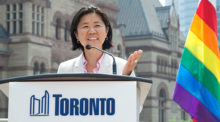Dee Keilholz
Standing in front of her audience at the University of Toronto’s Munk School of Global Affairs, Kristyn Wong-Tam, Toronto’s first openly gay, racialized city councillor, looks confident, as if she has always been headed towards a successful political career. The reality, however, couldn’t be further from the truth, shares Wong-Tam at the latest instalment of the Richard Charles Lee Asian Pathways Research Lab speakers series. Her life and career, she says, has been “a path with many twists and turns”.
The first “twist” happened early in her life – when Wong-Tam was three, her parents decided to leave Hong Kong for Canada. Wong-Tam spent her childhood growing up in Toronto’s Regent Park neighbourhood. After coming out to her parents at the age of sixteen, she left her home to find a new “chosen family” in Toronto’s LGBTQ community. It wasn’t until 2010, around the time she organized a city hall sit-in over then-Mayor Rob Ford’s “Oriental” comments, that she first considered a political career.
“Prior to becoming an elected official I never thought that could be my path,” she says. “I never thought that a kid from a poor Hong Kong neighbourhood, somebody who is like me and looks like me, could ever hold political office, but I’ve meanwhile learned to never say never.”
Wong-Tam was elected city councillor in 2010 and has since been known to champion social justice and equity, including the development of gender-responsive budgeting at the municipal level and Toronto’s first LGBTQ youth shelters.
Capturing the complex journeys of Asian Canadians like City Councillor Wong-Tam is exactly what the Pathways Lab has set out to do. The speakers series is the lab’s latest effort to foster an open dialogue between researchers, policymakers, students and community members about migration from Asia to Canada, focusing on real-life experiences of socio-cultural belonging.
“Personal testimony and narrative can help others understand the complicated processes of migration. It can help illustrate and make meaningful what is otherwise just analysis of data and trends,” says Emily Hertzman, a postdoctoral fellow at the Munk School’s Asian Institute and manager of the Pathways Lab. “Don’t get me wrong – data is really useful, but it can’t translate those experiences and evoke feelings the way that personal stories can. I think we are all truly narrative beings.”
Capturing the complexity and nuances of each individual story, while revealing common themes, is at the heart of Pathways Lab’s research. The lab focuses on training students in qualitative research methods to explore topics like identity, mobility and citizenship and develop theoretical and methodological frameworks. On a more personal level, Hertzman also believes that conducting this kind of research provides an opportunity for the lab’s students – many of them first- or second-generation Canadians – to explore their own history and identity:
“Many of our students have complicated stories of escaping political unrest or having to leave their country to pursue higher education. This is an opportunity for them to learn about their own identity, to change false or negative perceptions and find inspiration in their search for role models.”
Hertzman hopes that over time, stories and other qualitative data collected by student researchers will generate a database of community history that would otherwise be lost. A first foray into creating a story archive took place this summer, in the form of the Pathways Lab’s Grandparents project an archive of life-history interviews with Asian Canadians.
Most recently, a group of students funded through the Insight Through Asia Challenge started working on a policy report investigating University of Toronto’s international student experience. Through in-depth interviews and focus groups, the team has set out to capture, in non-reductive or stereotypical terms, students’ lived experience beyond stereotypical assumptions to gain a better understanding of the barriers and opportunities for students from China and Korea to integrate into life on campus and life in Toronto.
“Any research will tell you that Toronto is one of the most diverse cities in Canada,” says Hertzman, “But what does that actually mean for the individual? What’s their experience like? If we come together to understand that experience, it allows us to know each other better.”
The Pathways Lab Speaker Series is an ongoing event series and open to the public. Check the Asian Pathways Research Lab calendar for new events and information about speakers.
October 26, 2017
